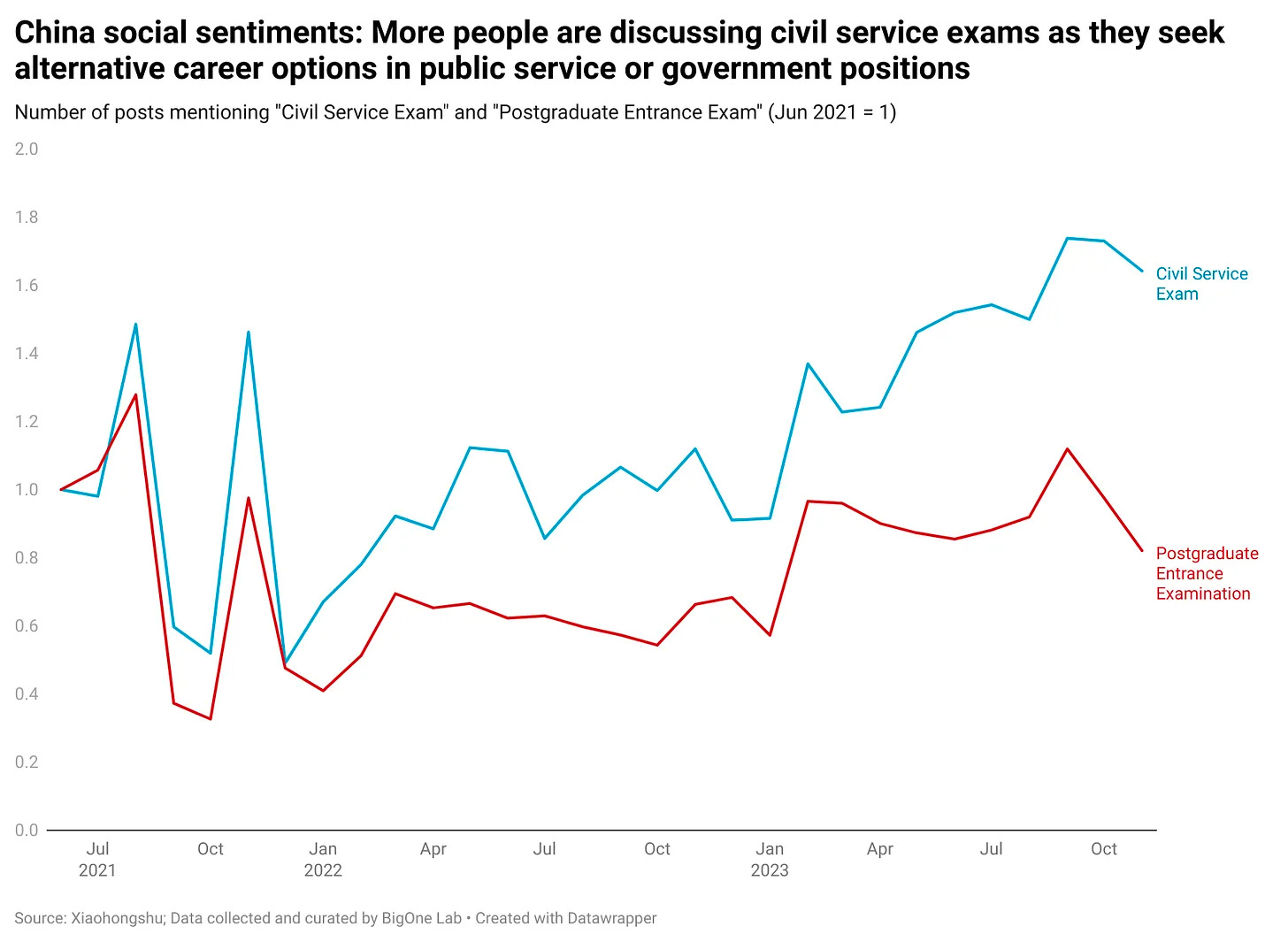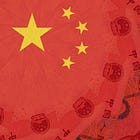China's Discourse: new regulations shaking up the online gaming industry; the epic corporate battle at East Buy; new private court paper databases stirring debate; challenges facing college graduates
4 essential discourses to gauge China's latest social and economic temperature
Gain insight into the latest social and economic developments in China through our curated selection of four pivotal discourses. These discussions have been chosen for their relevance and wide-ranging impact, showcasing significant structural shifts currently unfolding in China - some being controversial topics that resonate deeply in the community. Despite their importance, these conversations often remain underrepresented in mainstream Western media.
Today, we highlight the recent corporate battle at East Buy, the live-streaming e-commerce arm of the New Oriental Education Group. We also discuss the shake-up of the China online gaming industry, the current situation of China's young individuals pursuing graduate degrees for better career options, and last but not least, the new private legal document repository that has raised concerns about judicial transparency.
The epic corporate battle at East Buy (1797.HK), the live-streaming e-commerce arm of the New Oriental Education Group (EDU)
What happened: In 2021, China banned all after-school tutoring for core subjects, sending shockwaves through the education sector and wiping out almost all of the market capitalization of the industry leader, the New Oriental Education Group (NYSE: EDU). Despite the initial downturn, EDU diversified into e-commerce by launching the live streaming arm "East Buy" (1797.HK), which became an instant success and became EDU's second growth curve after the core business was impacted by the regulatory changes.

Dong Yuhui, a former English tutor at New Oriental, played a pivotal role in helping the company transition into the e-commerce sector. Since the halt of private tutoring in 2021, Dong Yuhui became an internet sensation overnight in June 2022 following a viral live-streaming session on Douyin, where he used English phrases and poetry to promote various products. Dong has become a sensation for his unique style of blending English education, Chinese poetry, deep knowledge of literature, cultured taste, and salesmanship. For example, in one of his moments of fame on June 9 of last year, he taught history lessons and Harari's book Sapiens to sell a bag of rice.
Yuhui's cultured style not only made him an internet sensation, but also significantly boosted Koolearn's share price. This made him the most important person in enabling the successful pivot of East Buy (formerly known as Koolearn Technology, which was once the ambition of New Oriental to enter the online education arena) from online education to e-commerce.
However, conflicts erupted as early as December this year and continued to escalate over the past few weeks. It all started with a seemingly harmless public post from the official account of East Buy, clarifying that Mr. Dong's speech was not solely his own work, but a collaborative effort involving the entire team, including the "little editors小编". Fans of Dong, who firmly believe that Mr. Dong deserves the majority of the credit and personally created most of the speeches, quickly challenged this statement, questioning the intentions behind it. This disagreement quickly turned into a heated argument between East Buy's official account and the fans, creating a major spectacle. Hundreds of thousands of Mr. Dong’s fans "cancelled" East Buy, causing a significant decline in East Buy's sales. CEO of East Buy, Mr. Sun Dongxu, made a public appearance but instead of calming the fans, worsened the situation, leading the public to suspect that there was more to this issue than just a rogue backstage editor. Many of Mr. Dong's fans believe that Dong is treated unfairly at East Buy and that management failed to give him enough credit for his pivotal roles in helping the company transition. At this point, things spiraled out of control for East Buy as fans abandoned the company and flocked to its competitor, Gaotu, another education-turned-e-commerce company. Gaotu's stock price doubled in just a few days, while East Buy and EDU suffered significant losses, wiping out nearly a billion dollars in value.
By the past weekend, the public has been demanding that Mr. Yu Minhong, the largest shareholder and ultimate decision maker of EDU, a renowned entrepreneur himself, choose between Mr. Dong and Mr. Sun. On Saturday, the decision was made, with Mr. Sun being dismissed as CEO and Mr. Yu assuming the role of interim CEO. As for Mr. Dong, he was offered an attractive package, a new title as vice president, and the opportunity to run a live-streaming studio under his own name. Subsequently, Mr. Yu and Mr. Dong made several public appearances together. Mr. Dong appeared tired yet grateful. He expressed his shock at the turn of events and his deep affection for EDU, East Buy, and Mr. Yu. Despite having the potential to earn more elsewhere, he declared his commitment to staying at East Buy. To underscore his loyalty, he quoted an ancient saying, "a noble person dies for kindred spirit" (士为知己者死).
The impact: Apart from its impact on the stock market and investor community, the event also sparks widespread discussion among Chinese citizens. Yuhui Dong’s success is not an isolated phenomenon; it signifies an important shifting trend in China’s e-commerce space, where consumers (especially urban consumers) increasingly seek a blend of culture and commerce.
More importantly, many Chinese corporate employees sympathize with Mr. Dong’s situation. They see that Dong was favored over the CEO and became pivotal to East Buy’s value and appeal. This represents a significant shift in the traditional corporate hierarchy in Chinese society, where the boss usually holds control. Dong’s personal values and quest for meaning and respect in work, despite lucrative offers, led him to stay with East Buy. This resonates with the vast consumers and employees in China, with many discussing on the internet that the quest for spirituality, culture, and inner peace matters more than the consumerist values of acquiring material gains.
Robert Wu’s recent cover on this topic nicely summarizes the key discussion and highlights a deeper shifting ground within China’s community, as reflected by the epic battle at East Buy. If you are interested in learning more about how these events reveal China’s changing consumer psychology and culture, we highly recommend reading Robert’s latest post on his personal Substack, Lost in Translation.
China’s new private court paper databases sparked significant controversies on judicial transparency
What happened: China announced the upcoming launch of a new legal repository called "全国法院裁判文书库" (National Court Judicial Document Repository) in January 2024. However, unlike the existing repository "裁判文书网" (China Judgement Online), this repository will be exclusively accessible for internal use within the judicial system.
The existing repository, "裁判文书网" (China Judgement Online), was established in 2013 and has been accessible to the general public. Over the past decade, it has made over 1 billion judicial documents available online, with the public making more than 100 billion queries.
The plan to launch a private legal repository has sparked widespread concerns about whether it would lead to the closure of the existing public repository. Legal professionals and the general public are worried about the potential implications for access to legal information, as this development is significant in China's legal and judicial landscape.
The new development: The internet debate surrounding recent events has been largely uncensored. In response to concerns about the future of online publication of judicial documents in China, the Supreme People's Court has affirmed its commitment to maintaining the public China Judgement Online and encourages public participation in building a case database. At the same time, both legal professionals and Chinese citizens express concerns about the declining quality and decreasing number of cases disclosed in the existing public repository in recent years. For example, only 854 documents were posted in 2022, despite over 670,000 administrative cases being concluded by national courts. [source]
A recent post on the WeChat account "法影斑斓", which is the personal blog of Fan He, the Vice Director of the Research Office of the Supreme People's Court of P. R. C and the former head of the Leading Group of the Judicial Reform Office, provides a summary of several interpretations of the implications.
The public repository will continue to operate: The Supreme People's Court has specifically mentioned in response to questions from journalists that "the existing China Judgement Online will continue to play its role," affirming the court's stance to maintain the operation of the public repository. [paragraph redacted]
The author also explained the relationship and intended purpose of the existing and new repositories:
Firstly, the "People's Court Case Library (人民法院案例库)" will primarily serve as a reference for judicial norms for legal professionals and as a guide for behavioral norms for the general public. Secondly, the "National Court Judicial Document Repository (全国法院裁判文书库)" [baiguan: the new repository] will present nationwide court data, providing a basis and reference for formulating judicial policies, advancing judicial reforms, and offering judicial recommendations. Thirdly, the existing "China Judgement Online (中国裁判文书网)" [the existing public repository] that has been running for ten years will remain in operation, continuously uploading new documents, and continuing its important mission of establishing a transparent judiciary, boosting judicial credibility, and strengthening the foundation of governance… The China Judgement Online is responsible for judicial transparency, the Case Library is responsible for judicial uniformity, and the Document Repository is responsible for decision analysis. [paragraph redacted]
Limited accommodation is available for China's young individuals pursuing graduate degrees for better career options
What happened: In recent years, some Chinese universities, particularly prestigious universities located in first and second-tier cities, have discontinued the provision of dormitories for part-time graduate students, graduate students with professional degrees, and local ones who have exerted tremendous effort to successfully pass the entrance examination. But why are increasing Chinese postgraduates still struggling under the weight of rental expenses?
This reflects an irreversible trend that universities' sustained substantial infrastructure resources have not kept pace with the enlarged enrollment of graduate students, increased studying time of graduates with academic degrees, and delayed graduation of those pursuing a doctorate. This discrepancy also highlights the exceedingly challenging and tough job environment faced by contemporary Chinese college students or other young individuals who are forced to pursue graduate degrees for better career options in the future.
The impacts: The contentious issue of limited accommodation for "overflowed" graduate students has sparked intense debates on overeducation and "credential inflation", which have made it difficult for job seekers with lower levels of educational qualifications to secure desirable and promising employment opportunities in the harsh job market. This has raised a thought-provoking question: Does Chinese society truly require such a large number of graduate students?
Given that pursuing a graduate degree is like a hard nut to crack and greatly challenging, more and more Chinese people are gradually considering the pursuit of graduate degrees unnecessary and misguided, particularly if the sole purpose is to shun employment pressure, especially in certain industries where practical work experience outweighs the actual degree itself, such as marketing, production management and so forth. Additionally, there has been a recent trend in which more and more people are discussing the "National Civil Service Examination" rather than the "National Entrance Examination for Postgraduates" on Xiaohongshu, China's largest lifestyle social media platform. This trend sheds light on the prevailing social climate, where becoming a civil servant, with its lifelong job stability, is still regarded as the most optimal choice for many young people who prefer a more leisurely yet guaranteed lifestyle over the unpredictable nature of the business environment.
Tencent (0700.HK) and Netease (9999.HK) overhauled by the new (potential) online gaming regulations
What happened: On December 22, 2023, China's National Press and Publication Administration released the "Online Game Regulations (Draft Amendment)" (hereinafter referred to as the Draft) to solicit public comments. This sudden shock, however, stirred up panic among gaming communities and corresponding investors, leading to a sharp decline in the stock prices of online game giants such as Tencent and NetEase and fevered speculation from the online game industry.
This inevitably challenges the current online game business model and may witness the turning point of the online game industry in China. The draft stipulates the establishment, management, and supervision of online game publishing and operating entities, including an extended approval process, a normative way of technology tests and trades of game currency, legitimate protection of minors, and restrictions on excessive game engagement and high consumption, aiming to improve the governance of online games.
For instance, online games shall not set up induced rewards such as daily login, first-time recharge, continuous recharge, etc. Online game publishers and operators shall not promote or condone high-priced trading behaviors of virtual props in the form of hype and auctions. All online games shall set user recharge limits and make them transparent in their service rules, and shall provide pop-up window warning reminders for users’ irrational purchasing behavior.
The new development: However, it is worth noting that this draft is still in the stage of soliciting opinions and has not been officially released and implemented. In fact, it was withdrawn from the solicitation system on the day it was published as a draft for soliciting opinions. On the second day after its publication, China's National Press and Publication Administration also stated that they will make further modifications and improvements based on ongoing feedback from relevant departments, companies, users, and other parties, and suggested that relevant companies continue to closely follow the updates.










If Chinese regulators are concerned that online games addiction causes financial distress, I suggest giving parents and spouses of addicted gamers the right to notice Tencent and NetEase (or the regulator) that addiction is causing financial problems and the addicted gamer should be restricted from gaming while undergoing counselling to end the addiction.
Just a suggestion!